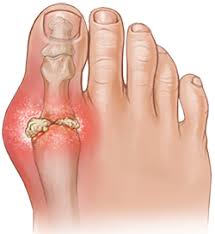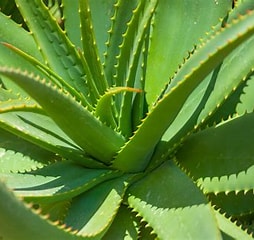
In this article, I will explain what Aloe vera is and highlight its various health and skincare benefits.
What is Aloe vera?
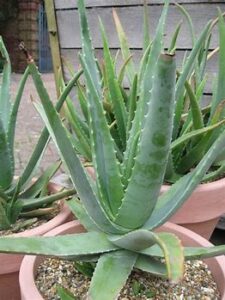
Aloe vera is a succulent plant species that is widely known for its medicinal properties.
It has thick, fleshy leaves that contain a gel-like substance, which is commonly used in various health and beauty products.
Aloe vera gel is rich in vitamins, minerals, antioxidants, and other bioactive compounds that contribute to its potential health benefits.
It has been used for centuries in traditional medicine for its soothing and healing properties, particularly for skin conditions such as burns, wounds, and sunburns.
Aloe vera is also consumed orally in the form of juice or supplements for its potential digestive and immune system benefits.
Description:
Aloe vera is a stemless or very short-stemmed plant that can reach a height of 60-100 centimeters (24-39 inches) and spreads by offsets.
Flowers:
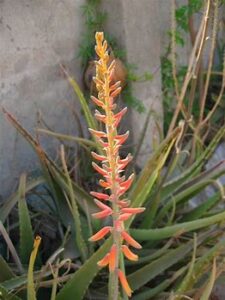
In summer, the flowers grow on spikes that may grow up to 90 cm (35 in). Each flower is dangling and has a yellow tubular corolla 2–3 cm (3⁄4–1+1⁄4 in) long.
Leaves:
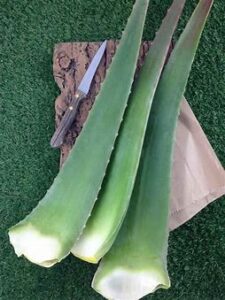
The leaves of Aloe vera are thick and fleshy, ranging in color from green to grey-green, with some varieties displaying white spots on both the upper and lower stem surfaces.
The leaf margin is serrated and features small white teeth.
Key characteristics of the aloe vera plant include:
Appearance:
Aloe vera typically grows in a rosette-like form with thick, fleshy green leaves containing gel-like substances.
The leaves have serrated edges and can reach lengths of 12 to 24 inches (30 to 60 centimeters). When the leaves are cut or broken open, a clear, mucilaginous gel is released.
Aloe Vera Gel:
Aloe vera gel is the most well-known and widely used part of the plant.
It is a clear, jelly-like substance found in the inner leaf pulp.
This gel is rich in various bioactive compounds, including vitamins, minerals, enzymes, amino acids, and polysaccharides, which contribute to its therapeutic properties.
Aloe Vera Latex:
Aloe latex, also known as aloe vera latex, is a yellowish, bitter-tasting substance found just beneath the outer skin of the aloe leaf.
It contains compounds called aloin and barbaloin, which have laxative effects.
While aloe latex can have some medicinal uses, it is not typically used for topical applications and should be consumed with caution due to its potential side effects.
Aloe vera has a long history of use in traditional medicine for treating various skin conditions and internal ailments.
It is commonly used for:
Skin Care:
Aloe vera gel is known for its soothing and moisturizing properties.
It is used topically to alleviate sunburn, minor burns, insect bites, skin irritations, and various skin conditions such as eczema and psoriasis.
Wound Healing:
Aloe vera can promote wound healing and reduce the risk of infection when applied to cuts, scrapes, and minor wounds.
Digestive Health:
Aloe latex, when used with caution, has been traditionally used as a natural laxative to relieve constipation.
However, its use for this purpose is less common today due to the availability of safer alternatives.
Oral Health:
Some toothpaste and mouthwash products contain aloe vera for its potential benefits in maintaining oral hygiene and soothing mouth ulcers.
Hair Care:
Aloe vera is also found in various hair care products, as it is believed to promote hair growth, reduce dandruff, and condition the hair and scalp.
Internal Health:
Some people consume aloe vera juice or supplements for potential internal health benefits, although the use of aloe latex internally is discouraged due to its potential side effects.
While aloe vera has numerous potential benefits, it’s essential to use it responsibly and consult with a healthcare professional if you plan to use it internally, especially in larger quantities.
Additionally, some individuals may be sensitive or allergic to aloe vera, so it’s a good idea to perform a patch test before using it on your skin or hair.
Always choose high-quality, pure aloe vera products for the best results.
What are the benefits of aloe vera?
Aloe vera is a popular plant known for its numerous potential benefits, particularly when used in topical applications or consumed as a dietary supplement.
Here are some of the benefits associated with aloe vera:
Skin Care:
Moisturization:
Moisturizing with aloe vera can offer several benefits for the skin. Aloe vera is known for its hydrating properties, which can help to moisturize and nourish the skin, leaving it feeling soft and supple.
It is also believed to have soothing and cooling effects, making it beneficial for dry or irritated skin. Aloe vera may help to reduce redness and inflammation, making it suitable for individuals with sensitive skin or conditions such as eczema or psoriasis.
Additionally, aloe vera contains antioxidants that can help to protect the skin from damage caused by free radicals.
However, it is important to note that individual results may vary, and it is always recommended to perform a patch test and consult with a dermatologist before incorporating any new skincare product into your routine.
Sunburn Relief:
Aloe vera is commonly used for sunburn relief due to its soothing and cooling properties. When applied topically, aloe vera can help to alleviate the discomfort associated with sunburns.
It may provide immediate relief by reducing redness, inflammation, and the sensation of heat on the skin.
Aloe vera also has moisturizing properties that can help to hydrate and nourish the sunburned skin, promoting the healing process.
Additionally, aloe vera may assist in minimizing peeling and dryness that often occur after sunburns.
However, it is important to note that aloe vera should not be used as a substitute for proper sun protection measures, such as wearing sunscreen and seeking shade.
In severe cases of sunburn, it is advisable to consult with a healthcare professional.
Acne Treatment:
Aloe vera is often used in acne treatment due to its potential benefits for the skin. It contains antibacterial properties that may help to combat the bacteria responsible for acne breakouts.
Aloe vera also has anti-inflammatory properties, which can help to reduce redness and swelling associated with acne.
It may assist in soothing and calming irritated skin, promoting the healing process.
Additionally, aloe vera has moisturizing properties that can help to hydrate the skin without clogging pores, making it suitable for individuals with acne-prone skin
However, it is important to note that the effectiveness of aloe vera in treating acne may vary from person to person.
It is recommended to consult with a dermatologist for personalized advice and to determine the most suitable acne treatment plan for your specific needs.
Wound Healing:
Aloe vera has been recognized for its potential benefits in wound healing. When applied topically, aloe vera gel can provide a protective barrier over the wound, helping to prevent infection and promote healing.
It contains various compounds that may aid in the wound-healing process, such as polysaccharides, vitamins, and minerals.
Aloe vera is believed to have anti-inflammatory properties, which can help to reduce swelling and inflammation around the wound.
It may also stimulate the production of collagen, a protein that plays a crucial role in wound healing and tissue repair.
Additionally, aloe vera gel can keep the wound moisturized, preventing it from drying out and promoting a moist environment that is conducive to healing.
However, it is important to note that while aloe vera may offer potential benefits for wound healing, it is not a substitute for proper wound care.
It is always recommended to consult with a healthcare professional for appropriate wound management and treatment.
Skin Conditions:
Aloe vera has been used for various skin conditions due to its potential therapeutic properties.
It is believed to have anti-inflammatory effects, which can help in reducing redness, swelling, and irritation associated with skin conditions such as acne, eczema, and psoriasis.
Aloe vera may also have antimicrobial properties that can help in preventing or treating bacterial or fungal infections on the skin.
Additionally, aloe vera’s moisturizing properties can help to hydrate and soothe dry or flaky skin, providing relief and promoting healing.
However, it is important to note that individual results may vary, and it is always recommended to consult with a dermatologist for a proper diagnosis and personalized treatment plan for specific skin conditions.
Rosacea:
Aloe vera may offer some benefits for individuals with rosacea, a chronic skin condition characterized by redness, inflammation, and visible blood vessels on the face.
While research on the specific effects of aloe vera on rosacea is limited, it is believed to have soothing and anti-inflammatory properties that can help alleviate symptoms.
Aloe vera may help reduce redness and inflammation associated with rosacea flare-ups, providing temporary relief.
It is also known for its moisturizing properties, which can help hydrate and soothe dry, irritated skin often experienced by individuals with rosacea.
However, it is important to note that rosacea is a complex condition, and what works for one person may not work for another.
It is recommended to consult with a dermatologist for a personalized treatment plan that may include aloe vera or other suitable options.
Hair Care:
Hair Health:
Aloe vera is believed to offer several benefits for hair health.
It contains enzymes that can help to promote a healthy scalp by removing dead skin cells and excess sebum, which can contribute to dandruff and clogged hair follicles.
Aloe vera also has moisturizing properties that can help to hydrate the hair and scalp, reducing dryness and itchiness.
It may help to strengthen the hair strands, making them less prone to breakage and damage.
Additionally, aloe vera contains vitamins and minerals that can nourish the hair follicles and promote healthy hair growth.
Some people also claim that aloe vera can help to reduce scalp inflammation and balance the pH level of the scalp.
However, it is important to note that individual results may vary, and it is always recommended to perform a patch test and consult with a dermatologist before incorporating any new hair care product into your routine.
Hair Growth:
Some people believe that aloe vera can stimulate hair growth, although scientific evidence on this is limited.
It may also help to reduce scalp inflammation, which can contribute to hair loss.
Vitamins A, C, and E, as well as folic acid and niacin, are essential for healthy hair.
However, it is important to note that individual results may vary, and aloe vera should be used as part of a comprehensive hair care routine.
Digestive Health:
Digestive Aid:
Aloe vera is often used as a digestive aid due to its potential benefits for the digestive system.
It contains compounds that may help to support healthy digestion and alleviate certain digestive issues.
Aloe vera juice or gel may have a soothing effect on the lining of the digestive tract, which can be beneficial for individuals with conditions such as acid reflux, irritable bowel syndrome (IBS), or inflammatory bowel disease (IBD).
It may help to reduce inflammation in the gut and promote healing.
Aloe vera is also believed to have laxative properties, which can aid in relieving constipation.
Additionally, aloe vera may support the growth of beneficial gut bacteria, contributing to a healthy gut microbiome.
However, it is important to note that individual results may vary, and it is recommended to consult with a healthcare professional before using aloe vera as a digestive aid, especially if you have any underlying health conditions or are taking medications.
Antioxidant Properties:
Aloe vera is known to possess antioxidant properties, which can provide several benefits for the body.
Antioxidants help to neutralize harmful free radicals, which are unstable molecules that can cause oxidative stress and damage to cells.
By reducing oxidative stress, aloe vera’s antioxidant properties may contribute to overall health and well-being.
Specifically, the antioxidant properties of aloe vera may help to protect the body against chronic diseases, such as heart disease and certain types of cancer, by preventing cellular damage.
Aloe vera’s antioxidants may also support a healthy immune system by reducing inflammation and enhancing immune function.
By preventing the effects of free radicals on the skin, one can slow down the aging process.
However, it is important to note that while aloe vera contains antioxidants, the extent of their benefits may vary depending on factors such as the quality and concentration of aloe vera used.
It is advisable to get expert advice on how to include Aloe Vera in your routine from a healthcare professional.
Dental Health:
Aloe vera is sometimes used in toothpaste and mouthwash for its potential to reduce gum inflammation and soothe mouth sores.
It is always a good idea to speak with a healthcare professional before taking any fresh supplements.
Additionally, always perform a patch test when using aloe vera topically to check for any allergic reactions or skin sensitivity.
Aloe Vera Juice?
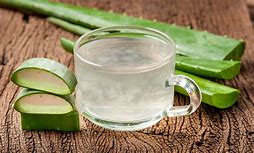
It is always a good idea to speak with a healthcare professional before taking any fresh supplements.
If you want to use the products for their health benefits, you should talk to a healthcare professional.
Can we use aloe vera directly from the plant?
Yes, you can use aloe vera directly from the plant.
The leaves of the plant contain a gel-like substance that is used for various purposes, including minor wound treatment.
Here’s how you can use aloe vera directly from the plant:
Harvesting the Gel:
Select a mature and healthy aloe vera plant.
It’s best to use a plant that is at least a few years old.
Carefully cut or break off one of the outer leaves.
Use a sharp knife or scissors to do this.
Place the cut leaf upright in a container to allow any yellowish latex (a bitter substance) to drain out.
The latex can be an irritant for some people, so draining it is recommended.
After a few minutes, you can rinse the leaf under running water to remove any remaining latex.
Extracting the Gel:
Lay the leaf flat on a clean surface, and use a knife to carefully remove the skin or outer layer on one side of the leaf.
Be cautious not to cut too deeply to avoid losing the gel.
Once you’ve removed the skin from one side, you’ll expose the clear, gel-like substance.
Use a spoon to scoop out the gel from the leaf.
You can collect it in a clean container.
Using the Aloe Vera Gel:
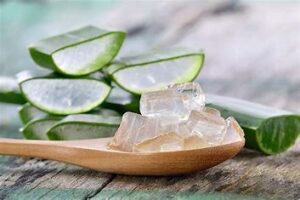
To treat sunburns, minor burns, wounds, or various skin conditions, you can apply it to your skin.
You can apply the extract gel to your skin immediately to treat a variety of skin conditions.
You can also apply aloe vera gel to your hair and scalp for hair care.
Store any unused gel in an airtight container in the refrigerator for future use.
Fresh aloe vera gel can spoil over time, so it’s best to use it within a few days.
You can access aloe vera’s raw, natural form by taking it straight from the plant, which is better for your skin and hair.
If you have sensitive skin or allergies, you should always perform a patch test before applying the gel.
If you experience any irritation or discomfort, discontinue use.



